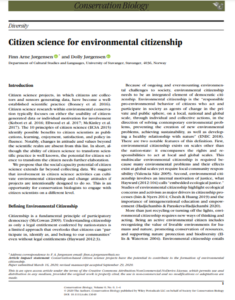Citizen science for environmental citizenship
Jørgensen, F. A., & Jørgensen, D. (2020). Citizen science for environmental citizenship. Conservation Biology.

Introduction
Citizen science projects, in which citizens are collectors and sensors generating data, have become a well‐established scientific practice (Bonney et al. 2016). Citizen science research within environmental conservation typically focuses on either the usability of citizen‐generated data or individual motivation for involvement (Kobori et al. 2016; Ellwood et al. 2017; McKinley et al. 2017). The 10 principles of citizen science (ECSA 2015) identify possible benefits to citizen scientists as publications, learning, enjoyment, satisfaction, and policy influence. Notably, changes in attitude and values beyond the scientific realm are absent from this list. In short, although the ability of citizen science to transform scientific practice is well known, the potential for citizen science to transform the citizen needs further elaboration.
We propose that the social capacity potential of citizen science extends far beyond collecting data. We suggest that involvement in citizen science activities can cultivate environmental citizenship and change attitudes if projects are intentionally designed to do so. This is an opportunity for conservation biologists to engage with citizen scientists on a different level.
